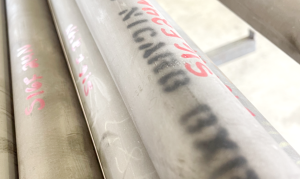 Metal pipes, tubes, pumps, and various metal parts play a crucial role in many industries, from equipment manufacturing to oil and gas production. These metal components can often be exposed to harsh conditions, including high temperatures, corrosive chemicals, and abrasive materials. Over time, this exposure can lead to wear and corrosion, compromising the integrity and lifespan of your equipment. To combat this issue, manufacturers have turned to protective coatings to extend the life of their metal components. In this blog post, we will explore the importance of protective metal coatings, delve into the electroless nickel plating process, and discuss alternative metal finishes and additives that can improve wear and corrosion resistance.
Metal pipes, tubes, pumps, and various metal parts play a crucial role in many industries, from equipment manufacturing to oil and gas production. These metal components can often be exposed to harsh conditions, including high temperatures, corrosive chemicals, and abrasive materials. Over time, this exposure can lead to wear and corrosion, compromising the integrity and lifespan of your equipment. To combat this issue, manufacturers have turned to protective coatings to extend the life of their metal components. In this blog post, we will explore the importance of protective metal coatings, delve into the electroless nickel plating process, and discuss alternative metal finishes and additives that can improve wear and corrosion resistance.
The Importance of Protective Coatings
Protective coatings serve as a barrier between the metal surface and the external environment, providing a layer of defense against corrosion, wear, and other forms of degradation. By applying a protective coating to metal pipes, tubes, pumps, and other metal parts, manufacturers can significantly extend the lifespan of these components, reducing maintenance costs and downtime.
One popular method of protective coating is electroless nickel plating. This process involves the deposition of a layer of nickel onto the surface of the metal through an autocatalytic chemical reaction. Electroless nickel plating offers excellent corrosion resistance and wear resistance, making it an ideal choice for many industrial applications.
Electroless Nickel Plating and Alternative Metal Finishes
Electroless nickel plating is a versatile and effective method for enhancing the performance and longevity of metal components. The process involves several steps, including cleaning and preparing the metal surface, applying a catalyst, and immersing the metal in an electroless nickel solution. The result is a uniform, high-quality nickel coating for tubes, pipes, pumps, and other metal parts.
In addition to electroless nickel plating, manufacturers can employ other types of metal finishes to improve wear and corrosion resistance. Two popular alternatives to electroless nickel plating are:
- High Phosphorus Nickel Plating: This type of nickel plating contains a high concentration of phosphorus, which enhances the corrosion resistance and hardness of the coating. High phosphorus nickel plating is particularly well-suited for applications where superior corrosion protection is required. Finding a high phosphorus nickel plating partner can be achieved by reaching out to specialized plating companies or searching online directories.
- Hard Chrome Plating: Hard chrome plating is an electroplating process where a layer of chromium is deposited onto a metal surface, enhancing durability, corrosion resistance, and wear resistance for industrial applications. Electroless Nickel is superior to hard chrome plating in our opinion.
Additives in Electroless Nickel Solutions
To further enhance the performance of electroless nickel coatings, some manufacturers add specialized additives to their electroless nickel solutions. These additives, such as silicon carbide, composite diamond particles, and boron nitride, can improve the hardness, wear resistance, and lubricity of the coating.
Silicon Carbide: Silicon carbide is a hard, abrasive material that can be added to electroless nickel solutions to increase the wear resistance of the coating. The addition of silicon carbide particles can significantly extend the lifespan of metal components subjected to abrasive wear.
Composite Diamond Particles: Composite diamond particles consist of diamond particles embedded in a nickel matrix. These particles can enhance the hardness and wear resistance of the electroless nickel coating, making it suitable for high-wear applications.
Boron Nitride: Boron nitride is a lubricious material that can be added to electroless nickel solutions to reduce friction and improve the lubricity of the coating. This can be particularly beneficial for components that require smooth, low-friction surfaces.
Pipe Coating Services and Electroless Plating
An Electroless plating company in Texas, a hub for oil and gas production, is known for their pipe coating services and the development of a product called Durabide®. Manufacturers in the oil and gas industry know this product as Ni-Carb, corrosion-resistant coatings to protect their metal pipes and components from the harsh conditions encountered in drilling, extraction, and transportation operations. Ni-Carb is Durabide and it is made by Dura-Tech Processes.
Durabide® is a high-performance coating that combines the benefits of electroless nickel plating with the added toughness of silicon carbide and other specialized additives. This unique combination of materials provides superior wear resistance, corrosion protection, and lubricity, making Durabide® an excellent choice for extending the life of metal components in the oil and gas industry.
Protective coatings play a vital role in extending the lifespan of metal pipes, tubes, pumps, and other metal parts exposed to harsh industrial environments. Electroless nickel plating is a proven method for enhancing the wear and corrosion resistance of metal components, and manufacturers can further improve the performance of these coatings by incorporating specialized additives such as silicon carbide, composite diamond particles, and boron nitride.
For manufacturers in the oil and gas industry, products like Durabide® offer a reliable and effective solution for protecting metal components from the extreme conditions encountered in drilling, extraction, and transportation operations. So when looking for a pipe coating service in Texas, consider Dura-Tech Processes, Inc for your coating needs.










